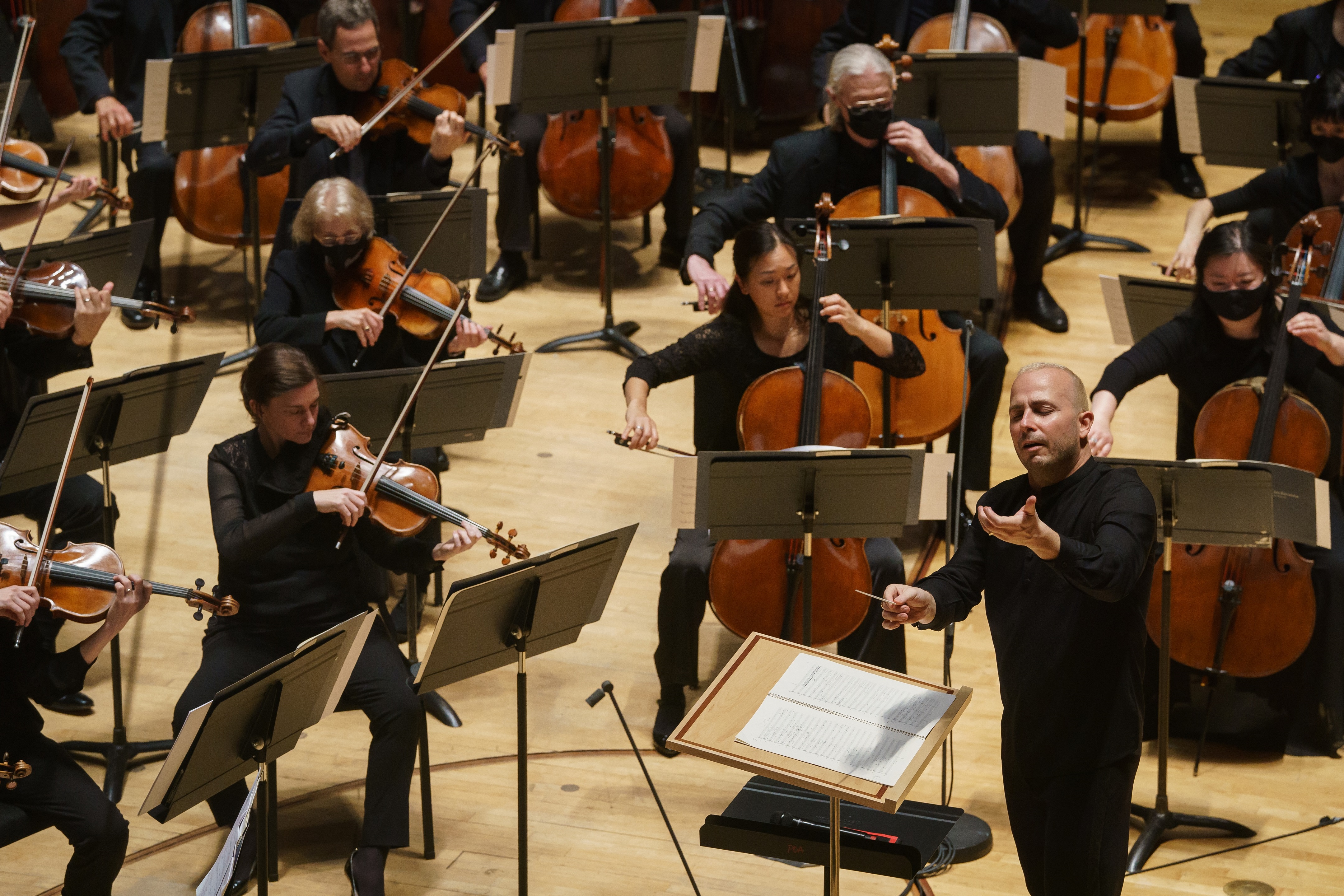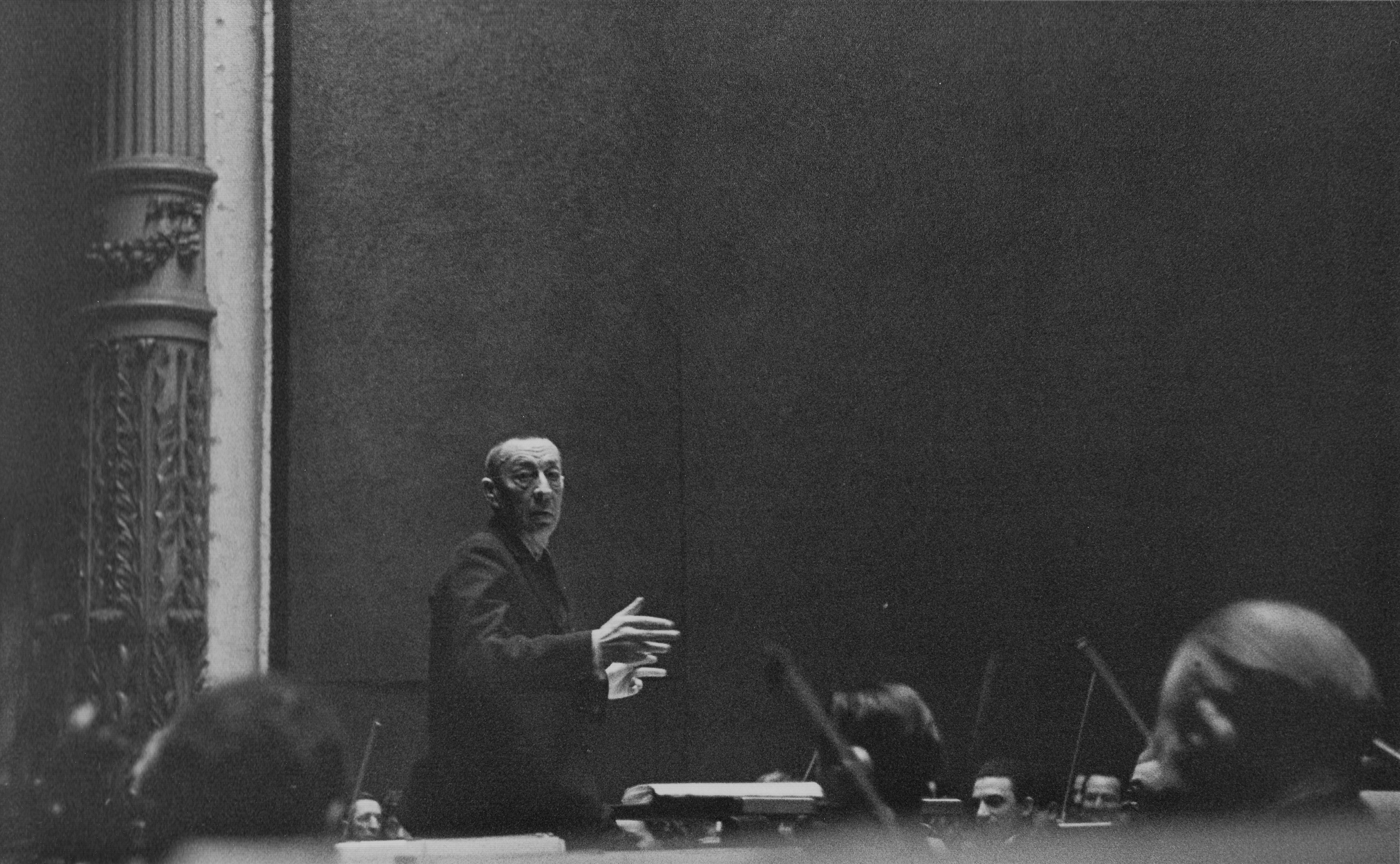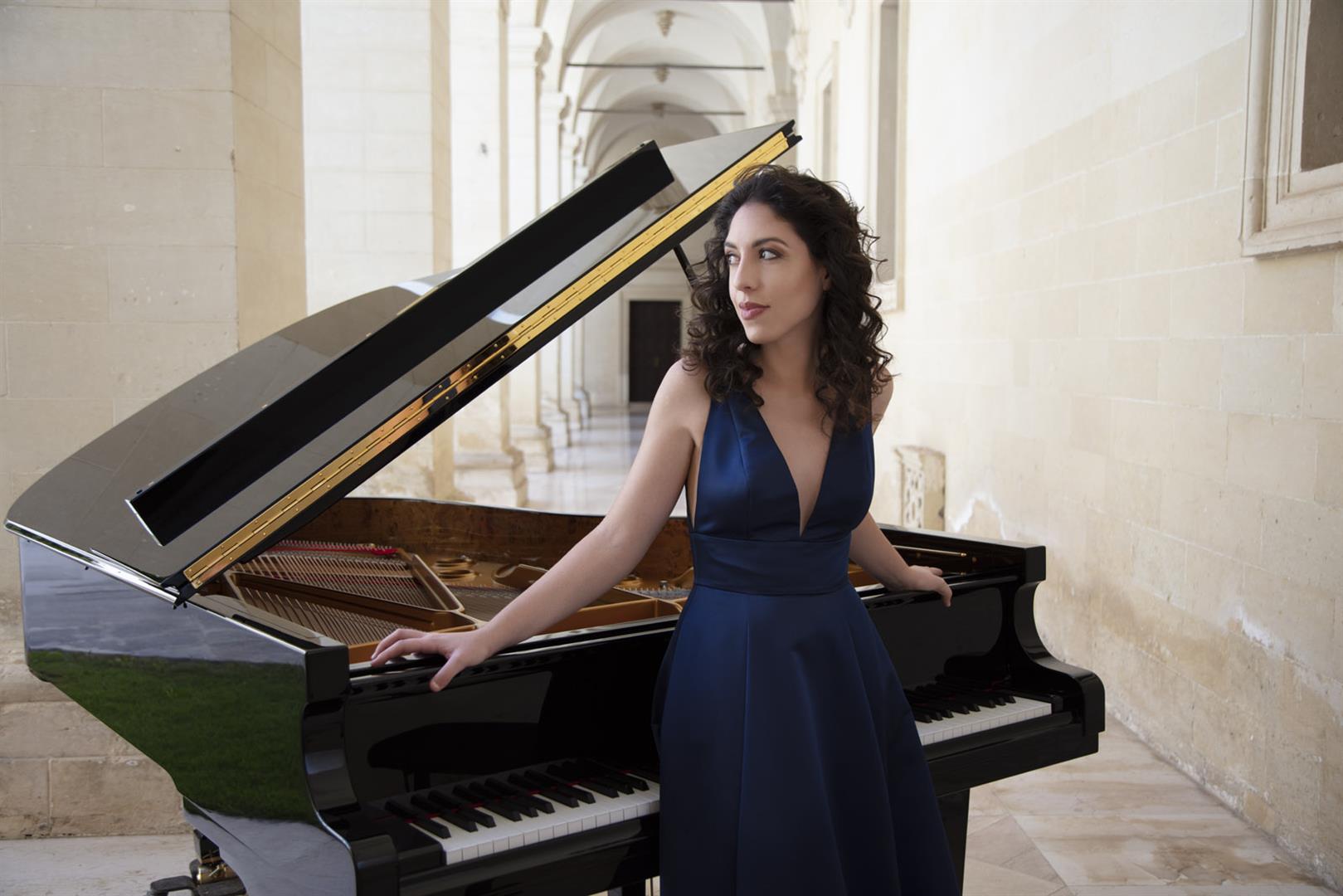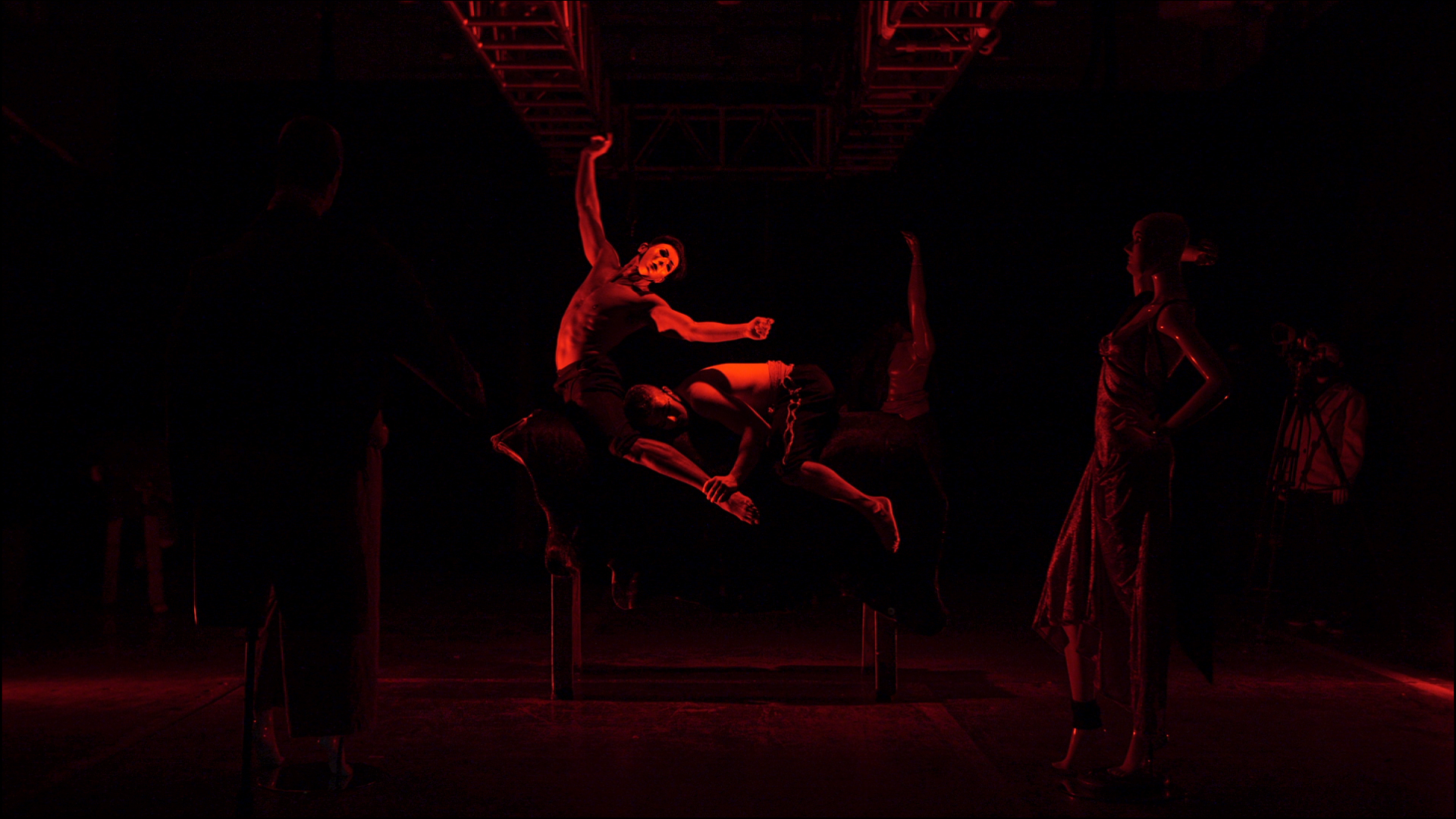When asked to pick some 2022–23 season highlights, wearing both his president and CEO hat and his music-lover hat, Matías Tarnopolsky laughs. “The two hats are absolutely the same thing! What keeps me going every day is the chance to hear the incredible concerts of The Philadelphia Orchestra. The upcoming season is extraordinary. Yannick Nézet-Séguin leads the way in his 11th season as music director, from Opening Night featuring superstar pianist Lang Lang, to Bruckner’s Te Deum and Ninth Symphony in a phenomenal conceptualization that Yannick is bringing to us, to ending the season with one of four world premieres.”

Music Director Yannick Nézet-Séguin and The Philadelphia Orchestra. Photo: Jessica Griffin
The music director himself points to additional highlights. “Part of the great joy that awaits us is our continued celebration of the extraordinary music of Florence Price, when we perform her two violin concertos with Randall Goosby and Third Symphony. I see connections between Price’s music from the last century and the music of two of today’s most inspiring composers: Composer-in-Residence Gabriela Lena Frank and John Luther Adams. In the 2022–23 season, when we perform the world premieres of Gabriela’s Picaflor and John’s Vespers of the Blessed Earth, we will discover their common ground, a continuum of music that points us to the future.”
Tarnopolsky also mentions Principal Guest Conductor Nathalie Stutzmann, who has an ever-deepening relationship with the Orchestra. She will bring her expertise in vocal music when she conducts Mozart’s Requiem. Her other appearances include Schoenberg’s Transfigured Night, Brahms’s First Symphony and Violin Concerto with Gil Shaham, and Dvořák’s “New World” Symphony.

Sergei Rachmaninoff conducting The Philadelphia Orchestra in 1939. Next season the Orchestra celebrates Rachmaninoff’s 150th birthday, with performances of his four piano concertos and the Paganini Rhapsody with Yuja Wang, his Third Symphony, and the choral symphony The Bells. Photo: Adrian Siegel Collection/Philadelphia Orchestra Archives
Another season highlight is a celebration of Rachmaninoff’s 150th birthday and his longstanding relationship with, and love for, The Philadelphia Orchestra. Yuja Wang will join Yannick and the Orchestra for two weeks of performances featuring all four of the composer’s piano concertos and the Rhapsody on a Theme of Paganini.
Vice President of Artistic Planning Jeremy Rothman is just as enthusiastic about the upcoming season. “We’re going to continue to welcome wonderful debut artists, such as cellist Sheku Kanneh-Mason, conductor Roderick Cox, and the Philadelphia-based chamber choir the Crossing, bringing a lot of diversity to the podium and the front of the stage. We’re also rediscovering works such as William Dawson’s Negro Folk Symphony, which was premiered in 1934 by Leopold Stokowski and the Philadelphians, and performing new-to-us works, such as Mary Lou Williams’s jazz-inspired Zodiac Suite, John Adams’s Dr. Atomic Symphony, Coleridge-Taylor Perkinson’s Sinfonietta No. 1, and Baroque composer Jean-Féry Rebel’s ‘Le Cahos’ from Les Élémens.
“Yannick has thoughtfully structured the season so that each program has a narrative and a reasoning behind it, and we hope will be a deeply meaningful experience. We continue to present great symphonic classics, such as Tchaikovsky’s Fourth Symphony, Stravinsky’s The Rite of Spring, and Berlioz’s Symphonie fantastique. We’re also continuing to transform our relationship, and the audience’s relationship, to the repertoire, and challenging expectations of what an orchestra concert can be. We want every concert to be a journey, relatable to something that you are talking about, thinking about, or experiencing in your daily lives. We’ve commissioned works such as Hilary Purrington’s Words for Departure, a meditation on the importance of investing in others and examining how we treat one another, and Wang Xi’s Ensō, named after the sacred symbol in Buddhism—a journey of looking for the flow of emptiness and fullness, and the togetherness of nature and people.”

Beatrice Rana performs the Philadelphia Orchestra premiere of Clara Schumann’s Piano Concerto. Photo: Warner Classics/Simon Fowler
Tarnopolsky explains the thinking behind this ongoing evolution in programming. “With the murder of George Floyd in the spring of 2020, we realized as an organization that we needed to speak more loudly on issues of social justice and creative equity in the world, and specifically in the world of classical music. We immediately made our commitment to equity on stage much more visible: in the choices of the music that we played, in the way we talked about it, in living this idea that music expresses thoughts and ideas that words alone cannot.
“There was a dramatic change in our programming. The first piece that we commissioned during this time was Valerie Coleman’s Seven O’Clock Shout, a tribute to the heroic front-line workers in the fight against COVID-19. We also had a series of programs with music by Florence Price, a Black composer whose works haven’t been given the attention they deserve, although Yannick’s and the Orchestra’s recent GRAMMY Award for their recording of her First and Third symphonies is helping to change that. In between all that, we launched a podcast called HearTOGETHER, which discusses issues of creative equity in the performing arts, with leading artists, thinkers, and activists. We also launched Our City, Your Orchestra, originally designed as a way to support Black-owned businesses, non-profit institutions, and other iconic Philadelphia locations affected by the COVID-19 pandemic. This free series connects The Philadelphia Orchestra with communities through music and dialog and celebrates the diversity and vibrancy of the Philadelphia region.”
Rothman stresses that it’s very important “how our work in the community informs what we do on stage and vice versa. For example, Gabriela Lena Frank is working with students at KIPP charter schools in Philadelphia on her commissioned piece Picaflor (Hummingbird). She’s engaging with those students in the creative aspect of the characters in the piece, which is based on a Peruvian fable, drawing inspiration from them and in turn inspiring them in her creative process.”

Marvel Studios’ Black Panther is one of three films that will be shown while the Orchestra plays the score live; the others will be Home Alone and The Muppet Christmas Carol.
The new season will unfold as the world is emerging from the shadow of the COVID-19 epidemic. “It’s been an unbelievable two years,” says Tarnopolsky. “We made commitments at the start of the pandemic: number one, to take care of our people. Number two, to ensure the financial integrity of the ensemble. And number three, to be here on the other side to help Philadelphia thrive. I am impressed every day by the total dedication of The Philadelphia Orchestra and of Yannick. What the pandemic has taught us is the power of collaboration, the power of music, the power of going forward with a single purpose. The musicians of The Philadelphia Orchestra and Yannick have embodied this throughout.”
Rothman describes the pandemic as “traumatic and awful. But at the same time there were some wonderful discoveries as a result of the conditions that we had to perform in. We encountered new composers and new artists; we found a new way of speaking through programming; a new way of addressing social and cultural issues; new ways of connecting with people digitally. These are all the positive things that will continue in our programming going forward.

Brian Sanders’ JUNK returns, performing to Rodion Shchedrin’s Carmen Suite (after Bizet)
“The question is, how do we enhance the experience that we adapted to during the pandemic? We’re not just going to flip the switch and go back to the way things were. This is a moment of progress and transformation to continue to rediscover these things and push ourselves.”
Tarnopolsky continues the thought. “Every day, we want to make sure that The Philadelphia Orchestra has ever deeper meaning in the lives of our audiences, in Philadelphia and around the world. We are the orchestra that brings joy through its performances, is innovative in its programming, and is always bringing people together. You can only achieve those moments of transcendence and beauty and connection with truly the world’s greatest musicians assembled on the stage. Philadelphia is so fortunate to have The Philadelphia Orchestra as its beating heart.”
Was there a moment during these “unbelievable two years” when Tarnopolsky could see a light at the end of the tunnel? “It was our Opening Night Concert this season. We began with the stage in darkness. Then there was a beautiful invocation, Langston Hughes’s poem ‘I Dream a World’ recited by our storyteller, narrator, and host, Charlotte Blake Alston, followed by the music of J.S. Bach performed by Yo-Yo Ma on solo cello. It was a moment of utter magic. And then, ever so softly, The Philadelphia Orchestra joined Yo-Yo in the Aria from Villa-Lobos’s Bachianas brasilieras No. 5, and it was at that moment of pure transcendence that I knew deep inside that everything was going to be okay.”
Steve Holt, managing partner at re:Write, is a veteran journalist and musician.